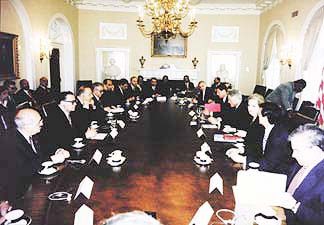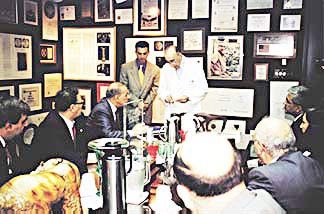|

Autumn 1997 (5.3)
Pages 15-18
Interview
Azerbaijan's
President, Heydar Aliyev - First Official Trip to the US
by Betty Blair, Editor of Azerbaijan
International
The following interview took
place during President Heydar Aliyev's first official visit to
the United States on August 3, 1997. It was the eighth day into
his 11-day trip in the United States (July 27-August 6) during
which time he visited New York City, Washington, D.C., Houston
and Chicago.
Two days earlier, President Aliyev had met with U.S. President
Bill Clinton and signed three major oil contracts in the White
House. This was President Aliyev's third visit to the United
States. He had addressed the United Nations (1994 and 1995) and
on both occasions met privately with President Clinton whom he
had met on other occasions including at the Summit of the Organization
on the Security and Cooperation in Europe (OSCE) in Budapest
in 1994.
Rarely do journalists ask President Aliyev personal questions.
When foreign journalists get the opportunity to interview him,
they usually ask routine questions that relate to the latest
political and economic developments in the region. On the other
hand, Azerbaijani journalists tend to follow a more formal traditional
journalistic style established during the Soviet period which
avoids personal topics.
Therefore, I have tried, as in other interviews beginning
in 1993 see AI 2.2 (Spring
1994), AI 2.4 (Winter
1994), AI 4.2 (Summer
1996), AI 5.1 (Spring
1997) and AI 7.4 (Winter
1999) to introduce topics that would reveal some of his
interests, his character and personality. As I was among the
60-member entourage (the only non-Azerbaijani) accompanying the
President on this tour throughout the United States, I intentionally
avoided the usual issues which had been discussed publicly on
a daily basis (see "Issues
- a Presidential Perspective").
This interview was conducted on the flight between Houston and
Chicago. Rauf Huseinov served as interpreter.
Photo: Betty
Blair, Editor of Azerbaijan International, with President Aliyev
on the chartered plane between Houston and Chicago on August
3, 1997. Minister of Foreign Affairs Hasan Hasanov looks on.
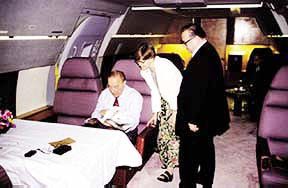  Let me start by asking you to comment
on the hospitality and warmth that you've received here in the
United States. Less than ten years ago, the United States and
the Soviet Union considered each other the worst of enemies.
This fear manifested itself in the build-up of vast military
arsenals on both sides even to the neglect of responsibly meeting
the social needs of both of their populations. Both nations boasted
the superiority of their own system over the other's. And they
both exploited their own propaganda tools to demonize the other
as the "insidious bad guy." Let me start by asking you to comment
on the hospitality and warmth that you've received here in the
United States. Less than ten years ago, the United States and
the Soviet Union considered each other the worst of enemies.
This fear manifested itself in the build-up of vast military
arsenals on both sides even to the neglect of responsibly meeting
the social needs of both of their populations. Both nations boasted
the superiority of their own system over the other's. And they
both exploited their own propaganda tools to demonize the other
as the "insidious bad guy."
Yet, today the warmth and
acceptance that you've received in the United States from the
highest level down, contradicts this era of suspicion and animosity.
Sometimes, it's hard to remember how cold and suspicious people
used to act towards each other. How do you explain this phenomenon?
As you know, the Soviet
Union no longer exists. As a super power, the Soviet Union (of
which Azerbaijan was a part) competed with the United States.
A Cold War raged for such a long time between us because the
world was basically split into two camps-capitalists and socialists.
The Soviet Union led the socialist camp and managed to attract
various countries to its side, especially African countries after
they gained their independence from colonization.
Left: President Aliyev meeting with President
Clinton in the White House on August 3, 1997.
Right: Dr. Michael DeBakey, famous heart surgeon,
speaks with President Aliyev at the Houston Medical Center on
August 6, 1997
But now the Soviet Union has disintegrated and the Cold War has
ended. If the Soviet Union had not collapsed, of course, Azerbaijan
would not be an independent country today. Had it not collapsed,
none of the former Soviet Union republics, including Ukraine,
with its sizable population of 50 million people, would be independent.
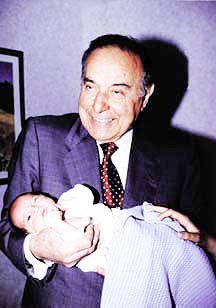  Photo: President Aliyev and his new grandson and namesake.
August 7, 1997, in London. Photo by Rafig Bagirov. Photo: President Aliyev and his new grandson and namesake.
August 7, 1997, in London. Photo by Rafig Bagirov.
But now finally, Azerbaijan
has achieved its national independence-once again after 70 years!
Now we're trying to strengthen and maintain our independence,
and I think this is one of the most important reasons why there
is such a warmth between the United States and Azerbaijan. You
have to take into account that there are countries in our region
which have tried to strangle our independence. That's why we
look to the United States as an opposing strength against those
forces who want to choke us. In other words, we look to the United
States as a country which will help us to preserve our independence.
Secondly, we are building a democratic state in Azerbaijan based
on law and secularism. In other words, Azerbaijan is making great
strides to live in accordance with Western standards. This is
another reason for the warmth and kind relations.
And thirdly, we have established broad expansive economic relations
with the United States. You've seen so many of these American
companies, particularly the oil companies, visiting Azerbaijan.
These past two days, both yesterday and today, I met with the
presidents and CEOs of many of these companies. It turns out
that the companies which have established themselves and are
already working in our country want to expand their operations.
And those which have not yet begun to work with us are looking
for ways to get started.
For example, one company admitted that a year and a half ago
their Board had made the decision not to invest in the Caspian
Sea region. But today, they've completely changed their minds.
They confessed to me that they had made a mistake and that they
are arriving late on the scene. Now, they're asking us to give
them a chance to get involved with developing a field in Azerbaijan.
So, all these factors together contribute to the warm, hospitable
relations that we are witnessing here in the United States.
For the past week, you've been emphasizing several major issues
in your speeches. I'd like to know if there are any other areas
that you consider critical for our readership to understand.
I'm referring to issues such as (1) the resolution of the Nagorno-Karabakh
conflict, (2) the need for Congress to repeal Section 907 of
the Freedom Support Act, (3) the issue of the illegality of Russia
supplying Armenia with $1 billion of arms that obviously were
used in the Karabakh conflict against Azerbaijan, (4) Russo-Iranian
relations, (5) the "status of the Caspian" in terms
of who "owns" the sea and can develop its oil resources,
(6) and finally, the business opportunities for foreign investors
in Azerbaijan. My question is, are there other major issues that
our readers should know about?
These are the main problems. If you succeed in conveying
these ideas to your readers, that's more than enough. Let your
readers understand those problems, then I'll give you some more.
Much of your time here in the United States has been spent
making speeches. It's the same back in Azerbaijan. I was particularly
impressed with both your speech and the question-and-answer session
that followed at Georgetown University. Your speech direct and
concise while at the same time providing necessary background
information that Americans needed to know to understand the issues
related to Azerbaijan.
As I've watched you over the years, it seems to me that much
of your power as President is bound up with your rhetorical ability
- your ability to express yourself and to persuade others. I
imagine that you've spent a lifetime making speeches. I was wondering
about some of your early experiences in public speaking.
Since you've brought up the
question, I'll tell you this is a talent that I was born with
it. It's innate. You can't get it simply by studying, or by working
hard or even by making many speeches. Obviously, my life experiences
do play an important role. I've done a lot of things. I've had
a lot of experiences. I've seen a lot of things, and I've stood
in front of many audiences. Therefore, the role of experience
can't be denied.
But the basis of my speaking ability is a talent which comes
from nature. You're born with it. If you don't have it, no amount
of experience will help. Yes, it's true from my youth that I've
always been a person who could express my views clearly. I started
making emotional speeches when I was about 17 or 18 years old.
But you've never seen me read my speeches. I never prepare in
advance.
And you have no speech writers like most other presidents
do?
No, I don't have a speech writer. Let me tell you what happened
a few days ago, when we were in the White House, Clinton was
making a speech from his notes and Al Gore also read from a text.
Gore spoke when he was signing one of the contracts as did Clinton.
They both had texts. But not me. It's all here (points to his
heart).
Do you practice your speeches before hand?
No. Ninety percent of it comes to my mind when I'm in the
process of speaking. Maybe, I prepare about 10 percent. But,
there are times when I'm in the middle of speaking, and I change
my thoughts. But, in general, I never practice before hand.
You never write down a single word?
Never. You've seen me. I never have any notes. Not even a
piece of paper. Never. I've been speaking this way for decades.
Even when I was a member of the Politburo, I was different from
others because of my speaking ability. Except for me, no one
spoke from his heart. Everyone read their texts. Everybody had
notes.
But many times there are so many distractions going on in
the room-TV cameras, microphones, people moving around. There
are so many things happening. How do you stay so concentrated
and not allow yourself to be disrupted no matter what's going
around you?
It's my specialty - my ability to remain concentrated.
Do you ever go home and say "Ah, I forgot to say something
important. I left something out."
If you're interested in knowing, let me tell you that when
I make a speech, my brain works with great power, I'm very conscious
of that. Sometimes, I even surprise myself. For example, when
we were signing the agreement, President Bill Clinton gave a
statement, and then I had to give mine. To tell you the truth,
I didn't know what I was going to say beforehand. But very quickly,
all the ideas came to mind. In the end, I was quite satisfied
with my own statement as were a number of people who commented
to me about it afterwards.
You once told me that when you were growing up in Nakhchivan,
you spent a lot of time going to the theater. Has theater played
a strong influence on your rhetorical ability? [Nakhchivan (pronounced
NAHKH-chi-vahn) known as the Autonomous Republic of Azerbaijan,
is the non-contiguous section of Azerbaijan located west of the
mainland and separated by a strip of territory which was given
to Armenia by Stalin].
No, I wouldn't say so. Theater is a hobby with me. I go to
the theater because I benefit a lot from it. It makes a deep
impression on me. It's very influential on me. But I wouldn't
say that theater plays a role in my speech-making. Theater is
very powerful for those who understand it, but it's not for everyone.
I understand theater, and I'd have to admit it has a greater
impact on me than either television or cinema.
Your granddaughter likes to give speeches, too. I've seen
her get up in public and with great poise recite poetry that
she's written herself. Takes after her grandpa!
That's true. Zarifa [about ten-years-old] is a very courageous
girl, and she's learned English very well.
Can you tell us a bit about your private meeting with Secretary
of State, Madeline Albright, a few days ago at the Blair House?
Well, we talked about the relations between the United States
and Azerbaijan. We spoke about the settlement of Nagorno-Karabakh
and about the resolution of the conflict between Armenia and
Azerbaijan. These were the main issues.
Mrs. Albright has a very positive attitude towards Azerbaijan.
And she has a very sincere, genuine relation towards me. I have
a great deal of respect for her. I consider her a very wise person.
President Clinton has chosen very well in selecting her to fill
this Cabinet position. She's a very useful and productive person.
What do you consider to be some of the highlights of this
official visit here in the U.S. apart from meeting President
Clinton and Vice-President Gore and signing three contracts in
the White House? What were some of the other moments that gave
you a great deal of personal satisfaction?
It was a very special moment for me when a lady came up to
me and showed me a photo that had been taken 20 years earlier.
It was a photo of me with the U.S. Ambassador to the Soviet Union
at that time. I appreciated her gesture for two reasons. First,
that an American family had considered that meeting which had
taken place so many years before as such a momentous occasion
that they had kept this photo for such a long time. That was
remarkable to me. It meant that the meetings and discussions
that I had in the past also made an impact and impressed someone
at that time. It seems that her husband had been the assistant
to the Ambassador. And that woman, a stranger to me, brought
this photo to me 20 years later and asked for my autograph.
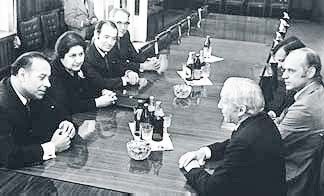  The Photo of Aliyev - 20 years earlier
brought as a souvenir. The Photo of Aliyev - 20 years earlier
brought as a souvenir.
At the same time, that photo
made me recall those years long ago, and I caught a glimpse of
myself and realized that I haven't changed so much. I look quite
the same. That, in itself, was gratifying.
Obviously, the sweetest moment for me was the birth of my grandchild
yesterday. I can't imagine anything sweeter than that! It was
an extremely special moment for me. And where did I hear about
it? In Houston-8,000 miles away from home during my visit to
the southern-most state of the U.S. on the border between the
U.S. and Mexico. Quite amazing, isn't it?
What's your grandson's name?
I haven't named him yet. I'll stop by London [where the baby
was born] in a couple of days and name him there. [Following
tradition, three days later, he bestowed his own name, "Heydar,"
on his grandson. This is the first grandson to carry the Aliyev
name].
Another personal highlight of this trip was meeting Dr. Michael
DeBakey. He's a very great person. He was the first person ever
to conduct heart bypass surgery. Today when we met him, he mentioned
that he has performed some 60,000 surgeries. Imagine how much
life he has given to so many people. As you know, Dr. DeBakey
was the only foreign specialist that Russian President Boris
Yeltsin invited to participate in his own recent heart surgery.
DeBakey is quite old, isn't he?
He's in his 80s. That's why I respect him so much. So aged,
and yet he still works so actively. You saw him. Maybe in the
U.S. you don't value him so much - I don't know. But he's an
extremely valuable person. That's why I wanted to visit him.
That's why I made time to include him in my program while I was
in Houston. He's a very famous person - a very great person.
And he's created a great medical center [Houston Medical Center]
there in the middle of a desert. I knew him from articles by
correspondents. It's an area I'm interested in because ten years
ago I had a heart attack myself.
So, you've been in contact with him?
No, he's involved with surgeries. There was no need for me
to have surgery. When I had a heart attack back then in 1987,
many people told me that I wouldn't live very long. That was
August 1987 - ten years ago. I had to stay in the hospital three
months. They told me I wouldn't be able to work anymore. But,
you see, here I am - still alive and working.
Your schedule is daunting. Don't you ever stop? Everybody
in the back of the plane is wiped out and exhausted. This is
the eighth day of your trip. Everybody's so tired, but you're
still going strong. How much rest do you get everyday? How much
sleep?
Very little-not more than six hours.
Do you take a rest in the middle of the day?
No. Never.
So where do you get all this stamina?
It comes from God.
Let me ask you about some of the gifts that you carried with
you to the U.S. Tell me about the carpet
which you presented to President Clinton. I understand it
was especially designed with the portraits of Bill Clinton and
his wife Hillary together.
I also brought a separate rug for their daughter, Chelsea.
President Clinton was quite pleased with them. He told me that
Chelsea stopped by that morning to look at them in his office.
He said she was quite happy and liked them very, very much -
they all did.
That's not the typical thing to do. To give a president a
gift that features both him and his wife and child. Where did
you get the idea to do that?
It was my idea. I know that for every man, his wife and children
are very dear - very precious to him. That's why I did it. It's
a way of commemorating them all in an art form that will last
for centuries.
Many people have varied opinions about Hillary. A lot of people
don't quite know what to make of her.
I don't know Mrs. Clinton very well, although I've met her
on occasion. When I've spoken with her personally, she has left
a very good impression on me. Anyway, it's impossible to be liked
by everyone - especially if you're a public figure.
Azerbaijanis have a habit of bringing back gifts to the people
they love when they return from a trip. What's your gift to the
Azerbaijani people?
The greatest gifts are the achievements that we secured here
in the United States. We signed an agreement with President Clinton,
strengthening the ties between our two countries on many levels.
These agreements will be of great historic value. In addition,
Mr. Clinton and I had a very frank discussion together about
the situation and relationship of our countries to each other.
You witnessed the meetings with the presidents of those oil companies
who signed contracts with us - the presidents of
Chevron, and ExxonMobil
and Amoco [preliminary contract]. Remember, I asked them if they
had ever visited the White House. They all told me "No."
Don't forget, some of those companies have been in existence
for 100 or more years. I joked with their leaders, asking them
from all those contracts they had signed all over the world,
if they had ever signed one in the White House. They admitted
they hadn't. Well, I did that. I brought them to the White House.
It was a momentous ceremony. Never in the history of the White
House has there ever been an occasion when three major oil contracts
were signed. These are the gifts I bring to my people.
From Azerbaijan International (5.3) Autumn 1997.
© Azerbaijan International 1997. All rights reserved.
Back to Index
AI 5.3 (Autumn 1997)
AI Home | Magazine
Choice
| Topics
| Store
| Contact
us
|


